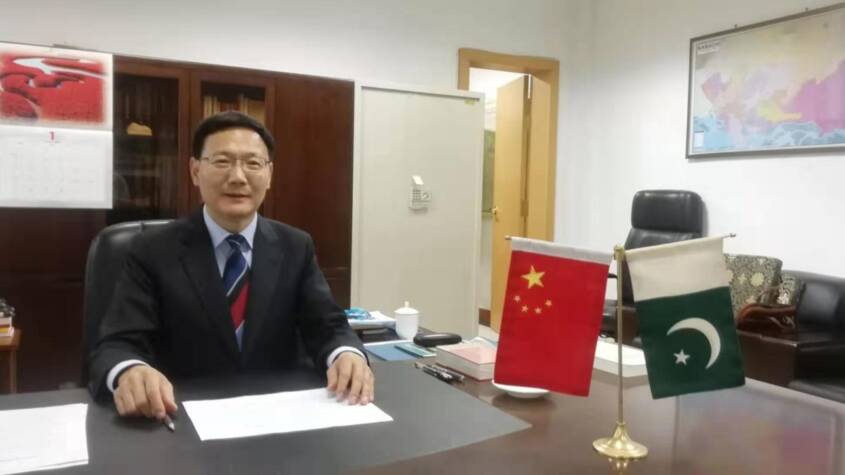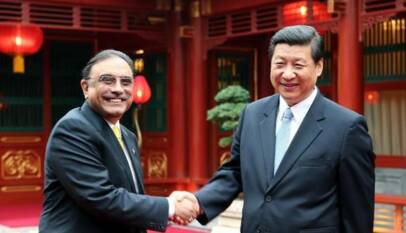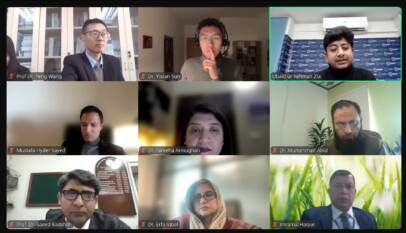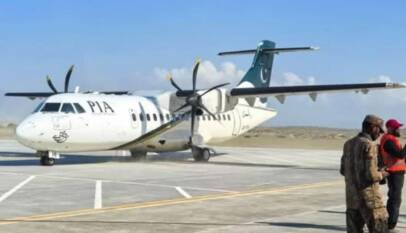Chinese consul general appreciates Pakistan for CPEC’s steady progress
Chinese Consul General in Karachi, Li Bijian has said that the CPEC is a signature project of the BRI, and has served as a fine example of cooperation and partnership for short and long term mutual benefits. He also mentioned that the first phase of CPEC has been completed and focuses on development and upgradation of infrastructure, and setting up energy generating projects including those of renewable energy. He also appreciated the efforts by the Government of Pakistan and the country’s law-enforcement agencies in providing a secure environment for CPEC’s development.
KARACHI, Dec 22 (APP): China-Pakistan Economic Corridor being a signature project under Belt and Road Initiative by China has served as a fine example of cooperation and partnership for short and long term mutual benefits.
China, Pakistan and other Islamic countries in the region are working to synergize their development strategies under CPEC.
As an all-weather strategic cooperative partner, China always gave priority to its cooperation with Pakistan in its overall external cooperation, said Chinese Consul General in Karachi Li Bijian, at an interactive session with group of journalists at the Consulate.
He said, Belt and Road Initiative, BRI has two components – one over land known as Silk Road Economic Belt and another maritime component tagged as Maritime Silk Road. Once this initiative was executed, it would have tremendous economic impact on the related countries.
Under BRI, China intends to invest billions of dollars on infrastructure in many countries. The initiative would develop major industrial, agriculture and energy centers in the partnering countries and all these would strengthen the links with China.
The part of BRI falling in Pakistan was known as CPEC under which would be constructed industrial parks, agriculture farms, railways, airports, roads, agricultural centers, energy generating projects including big solar energy projects, he said.
The Chinese diplomat mentioned that the first phase of CPEC had been almost completed. It is focused on development and upgradation of infrastructure, and setting up energy generating projects including those of renewable energy.
Now, he added, with all seriousness both the governments were on execution of second phase of CPEC, which would mainly focus on agriculture, manufacturing and other areas. Joint Working Committees on CPEC had been pursuing these projects spread in many areas of Pakistan. All the projects under CPEC had been progressing well, however COVID-19 pandemic had slowed down the process.
He said in Sindh, under CPEC, China was major partner in Dhabeji Special Economic Zone, Korangi Industrial Park, Coastal Development projects, Thar coal mines development, infrastructure development projects, and renewable energy projects.
Chinese companies had also partnered Sindh Government in upgrading transport system in Karachi, Hyderabad, Thatta and Sukkur. The companies would soon provide 150 buses to Sindh Government under this move.
Chinese companies were engaged in manufacturing sector as well, which included assembling of mobile phones and motorcycles, also under joint ventures. Li Bijian appreciated the role of Pakistan government, Pakistan armed forces and other law enforcing agencies in providing security cover to the Chinese companies.
Chinese Consul General Li Bijian appreciated Pakistan Federal and Provincial government’s policies to manage the situation emerging from COVID-19 pandemic which damaged badly economies and created serious problems for the world. Pakistan adopted policy of “safety of life and livelihood” through carrying out dynamic measures to implement SOPs and “smart lock-down”.
To another question, he said Coronavirus affected China’s economy due to lockdowns; tourism was the most affected sector. Now, with strict compliance of SOPs and implementing the dynamic zero COVID policy, domestic tourism was open.
About Omicron, new COVID-19 variant, he said that so far a few imported cases were reported in his country, adding that experts researched much about this variant, and he was confident that China would deal with the new variant in an orderly and decisive way. China had adopted 4-Es strategy to contain spread of the virus: early detection, early reporting, early quarantine and early treatment, which turned out to be very efficient to put the pandemic under control.
In China, more than 84 percent population was vaccinated and an aggressive campaign continued to vaccinate the remaining 16 percentage population. Booster doses were also being given from June 2021 to reduce the possible effect of mutated variant. While trying every means to control the pandemic domestically, China had been carrying out international cooperation in this regard and so far had provided more than 1.8 billion doses of vaccines to other countries.
China had been striving to build a community of health for mankind, he said.
Referring to the policies of his government, he said Communist Party of China had been implementing the policy of putting people first and focused on the improvement of peoples’ livelihood and sustained economic growth.
China had realized the first centenary goal of building a moderately prosperous society in all respects and eradicated the absolute poverty which had been with the Chinese nation over thousand years. Chinese had a very clean and honest government enjoying support of more than 95 percent population.
CPC had been delivering to the people and even on country side, the farmers had been enjoying an ever-changing and prosperous livelihood. There were the best roads and other communication network in the county side.
“ My government has been trying to help the people, and majority of Chinese people are satisfied.” Chinese Consul General concluded.
President Asif Ali Zardari to visit China in first week of Feb
ISLAMABAD: President Asif Ali Zardari will visit China in the first week of February, wher…











